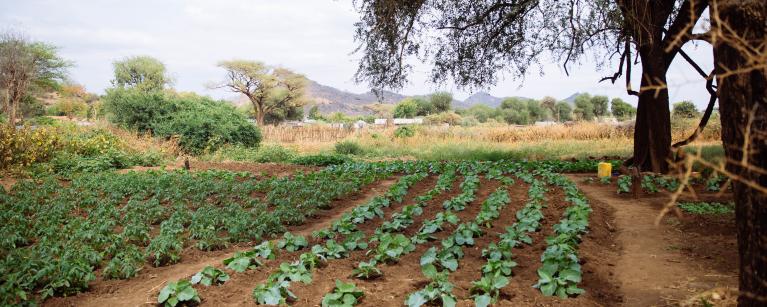For generations, pastoralism has defined life in Marsabit County. Families measured their wealth and security in cattle, goats, and camels. But when prolonged drought hit – followed swiftly by floods in 2023, everything changed. Livestock herds were decimated, and households that had relied solely on animals for survival were pushed years back. Many families found themselves struggling to make ends meet. Out of necessity and resilience, a new path is emerging agriculture and agribusiness.
The Ogas Women Group
In Uran, the Ogas Women Group has embraced this change wholeheartedly. For the past nine months, the group has been tending a kitchen garden that now brims with beans, kale, spinach, bell peppers, tomatoes, sweet potatoes, pawpaws, and bananas. Their success is the result of both determination and support. Through funding from Australian Aid channelled via Oxfam in Kenya, Strategies for Northern Development, have offered training to the women group which counts 52 members. They have also received farming tools such as rakes, jembes (hoes), water tanks, piping and a green house.
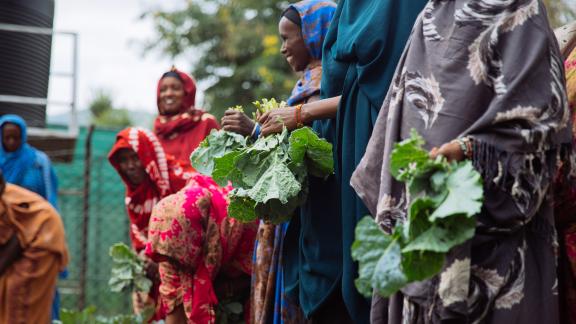
Ogas Group women at their farm. Photo: Peter Irungu.
After the drought, we received land from the water users committee in Uran. This is when we started agro-business, we could not afford to rely on pastoralism alone. When we started farming, we had to fetch water from the borehole, four kilometers away using wheelbarrows. Explains 40-year-old Ware Duba, chairperson of the Ogas Women's Group.
“After the drought, we received land from the water users committee in Uran. This is when we started agro-business. We could not afford to rely on pastoralism alone. When we started farming, we had to fetch water from the borehole, four kilometres away using wheelbarrows.”
SND installed a 50,000-cubic-metre steel tank through the that now irrigates the gardens. With the reliable water, the women not only feed their households but also harvest surplus produce to sell in local markets.
As Ware confidently puts it, the progress they have made so far in farming and business, has been an eye opener for the women group. They share their profits and would like to expand into potato and beans farming, and even venture into selling diesel.
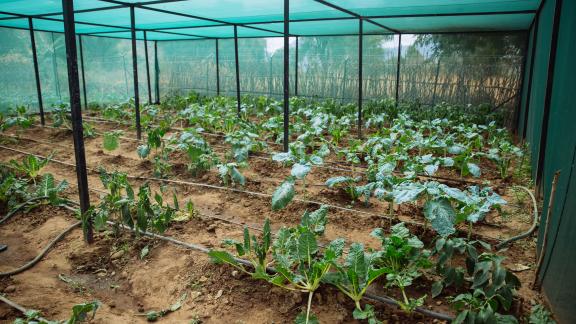
Greenhouse of the Ogas Group. Photo: Peter Irungu.
Biqila Youth Group
Right beside the Ogas Women Group farm, the Biqila Youth Group is cultivating its own future. Formed in 2014, and now 15 members strong, the group is putting their KSh 500,000 grant to work – fencing their farm, drip irrigation pipping, planting kale, carrots and pepper, and running a thriving tree seedling nursery. Their farm also features innovative conical gardens, a method of maximizing space and water efficiency. Beyond crops, the group envisions balancing crops with goat restocking, combining the traditions of pastoralism with modern agriculture to create sustainable livelihood model.
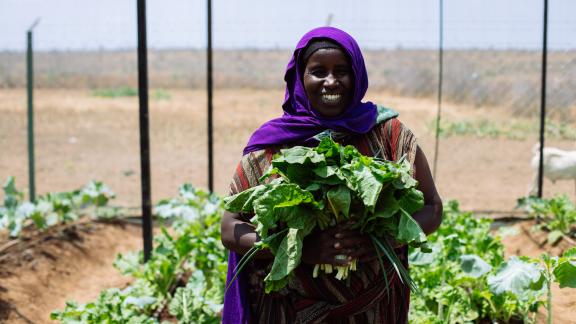
Bone Dadach Iya, a member of the Biqiltu Women Group in Rawana, Marsabit, holds up kales from the group's farm. Photo: Peter Irungu.
Elsewhere in Rawana, the Biqiltu Women Group has also taken to farming, using drip irrigation and a greenhouse to grow spinach, kale and spring onions for sale.
Elle-Dimtu Women Group
In Ellebor, the Elle-Dimtu Women Group which has been active in for 14 years – chose to invest differently. With their grant, they established two shops, running both wholesale and retail businesses. Members rotate shifts to manage the stores, which have become essential, serving not only their village but the neighbouring communities too.
“One thing I learnt is that these grants given to women groups will support the income capacity of the selected households and their means of survival because now we can confidently feed our children and take them to school because we now have stable income and all our families can depend on it,” shares Huko, the chairlady of Elle-Dimtu women group.
Her words capture the spirit of a community in transition – one that is diversifying its livelihoods, seizing opportunities, and building resilience for the future.
“We were so happy to receive the grant,” says Huko with a smile. “We could not believe it.”
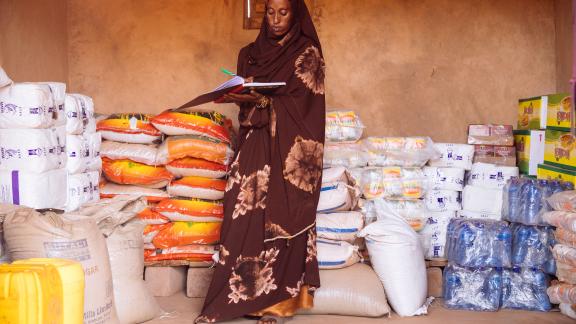
Fatuma Budha, Elle Dimtu Group's secretary taking inventory at the wholesale shop. Photo: Peter Irungu.
“One thing I learnt is that these grants given to women groups will support the income capacity of the selected households and their means of survival because now we can confidently feed our children and take them to school because we now have stable income and all our families can depend on it.”

Huqo Godana Waqo, Chairlady Elle-Dimtu Women Group sits at her shop Ellebor, Marsabit Photo: Peter Irungu.
From farms to shops, from irrigation tanks to innovative gardens, these community groups in Marsabit are writing a new chapter in their history. Their shift from exclusive reliance on pastoralism to diversified livelihoods is not just about survival – it is about choice, resilience and dignity. By blending tradition with innovation, they are proving that when communities are supported with resources, skills, and trust, they can not only withstand shocks but also build stronger, more suitable futures for generations to come.
Story by Oxfam Communications
